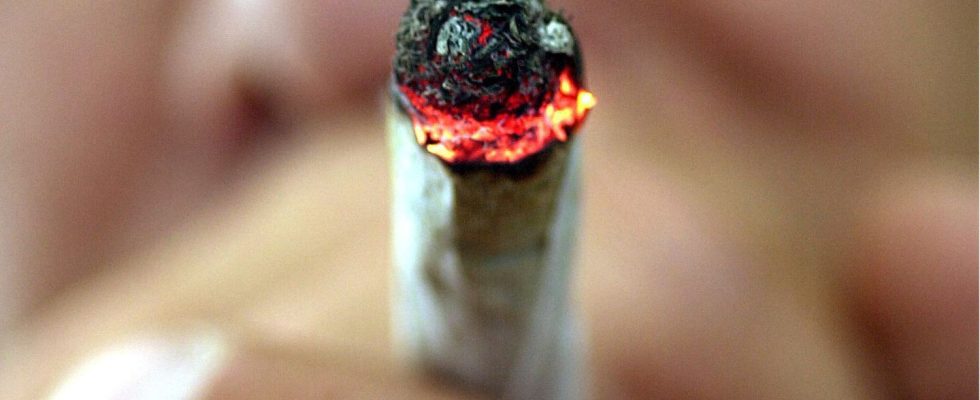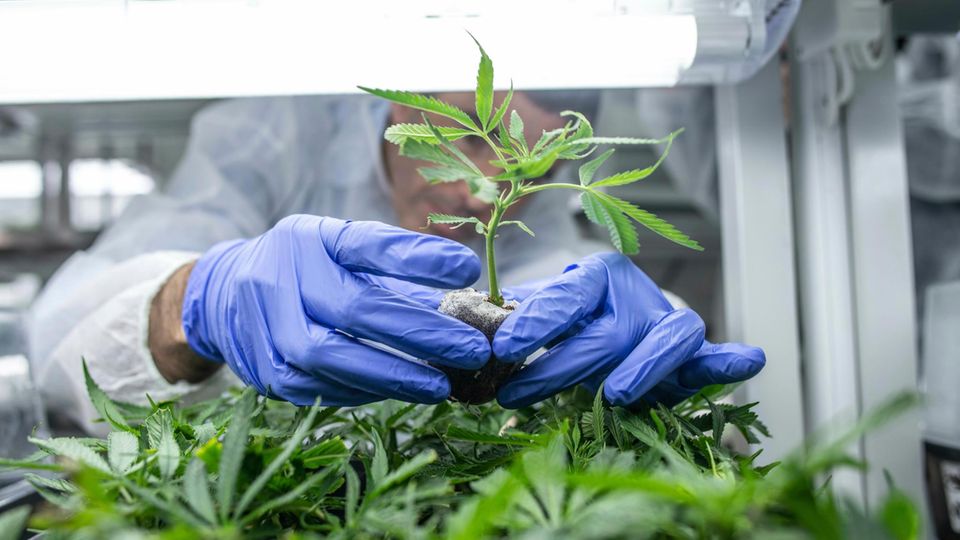Analysis from Denmark
Cannabis: In young men, schizophrenia is often the result of excessive smoking
Smoking weed should soon be legal in Germany.
© Boris Roessler/dpa
No illegal drug is consumed more in Germany than cannabis. “Grass” is considered relatively harmless. However, researchers are now using the example of schizophrenia to show how dangerous excessive smoking can be for the psyche.
Schizophrenia is considered one of the most serious mental illnesses. One in 100 people worldwide will get the disease at least once in their lifetime. According to the Robert Koch Institute (RKI), people between the ages of 18 and 35 are most at risk. The use of cannabis could play a far greater role in this than previously thought. A team of researchers has now found that up to 30 percent of all schizophrenia cases in young men can be traced back to problematic cannabis use.
The researchers used a huge dataset from Denmark to look at how so-called cannabis use disorders (CUD) and schizophrenia are related. CUD criteria include heavy use, strong craving for the drug, or giving up or limiting important social, work, or leisure activities. The results have now been published in the journal Psychological Medicine.
Cannabis use: risk factor for schizophrenia
Previous studies had already shown that cannabis use disorders can be associated with serious mental illnesses, such as schizophrenia – this applies to men as well as women. Now researchers around Carsten Hjorthøj from the University Hospital Copenhagen have examined who is at highest risk. The analysis shows that 15 percent of all male schizophrenia in Denmark in 2021 could have been avoided without cannabis use disorders (CUS). For women it was four percent. The proportion was particularly high at up to 30 percent among younger men aged 21 to 30.
The researchers conclude that CUS is an important risk factor for schizophrenia. They had collected data from more than 6.9 million men and women from Danish health registries. Around 45,300 of these people had been diagnosed with schizophrenia. The researchers then looked at which individuals in each gender and age group also had known cannabis use disorders and then estimated the proportion of all schizophrenia cases associated with such a disorder.
The researchers also point out that the number of people with a cannabis use disorder has generally increased over the years and that the THC content in cannabis products is also increasing. In Denmark, an average of 13 percent was measured in 2006, and in 2016 the THC content was 30 percent.
Higher THC content, more psychotic disorders?
Their representative, nationwide study extends the finding of a 2019 case-control study by Marta Di Forti and her team. At that time it was found that in cities where cannabis products with a particularly high THC content are regularly consumed, the number of psychotic illnesses is also particularly high. Eleven European cities were examined at the time, with Amsterdam and London taking the top spots. Consequently, the strength of the cannabis consumed could also be relevant to the risk of schizophrenia, the researchers believe.
The medical director of the German Center for Addiction Issues in Children and Adolescents (DZSKJ) at the University Hospital Eppendorf (UKE) in Hamburg, Rainer Thomasius, refers to another aspect of the study: “It is really frightening that, according to the analysis, the proportion of new cases schizophrenia that can be attributed to a cannabis use disorder has steadily increased over the past five decades.”
In many cases, this is the beginning of a long ordeal for those affected: “Schizophrenia is one of the most serious psychiatric illnesses because it is associated with a severely reduced quality of life, a high need for treatment, dependence and severe limitations in social participation,” explains Thomasius. Many develop schizophrenia early on, and almost three quarters of those affected have relapses, writes the RKI on its website. Cognitive performance is often impaired and mortality is increased. People suffering from schizophrenia are often unable to work or only to a limited extent.
Cannabis legalization planned
According to Thomasius, the study from Denmark can also be applied to Germany. In this country, cannabis is the drug that is most commonly consumed. According to the information provided by the Gesund.bund health platform, there were around 4.5 million people between the ages of 18 and 64 in 2021, 2.8 million of whom were men and 1.7 million women. So far, consumption is still illegal, but the German federal government plans to legalize cannabis. Thomasius and other experts suspect that consumption will increase overall.
“As a result of this increase, more people will develop a cannabis use disorder and the number of schizophrenia patients will increase. The incidence of cannabis-induced depressive disorders and anxiety disorders will also increase,” predicts child and adolescent psychiatrist Thomasius. A look at the German addiction help statistics shows that “of all illegal substances, mental and behavioral disorders caused by cannabis are the most frequently mentioned”.
Study co-author Nora Volkow warns in a press release: “As access to potent cannabis products continues to increase, it is vital that we also expand prevention, screening and treatment for people who experience mental illness associated with cannabis use could.” First author Hjorthøj sees another fundamental problem: “The increasing legalization of cannabis in recent decades has resulted in it becoming one of the most commonly consumed psychoactive substances in the world, while at the same time the public perception of the harmfulness of cannabis has decreased.”
Source: DPA, RKI 1, healthy.bund, German addiction help statistics, Federal Ministry of Health




